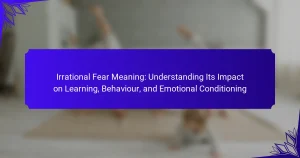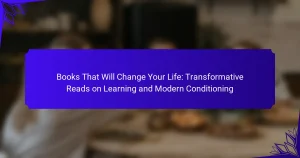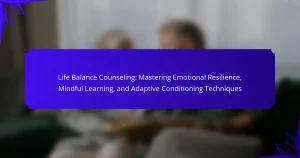Women often seek empowerment, resilience, and mindfulness to navigate modern life challenges. This article explores impactful self-help books that foster personal growth, highlighting notable titles and their unique insights. It also examines lesser-known works offering unconventional strategies and practical applications for daily life. By integrating these lessons, women can enhance their emotional well-being and build supportive communities.
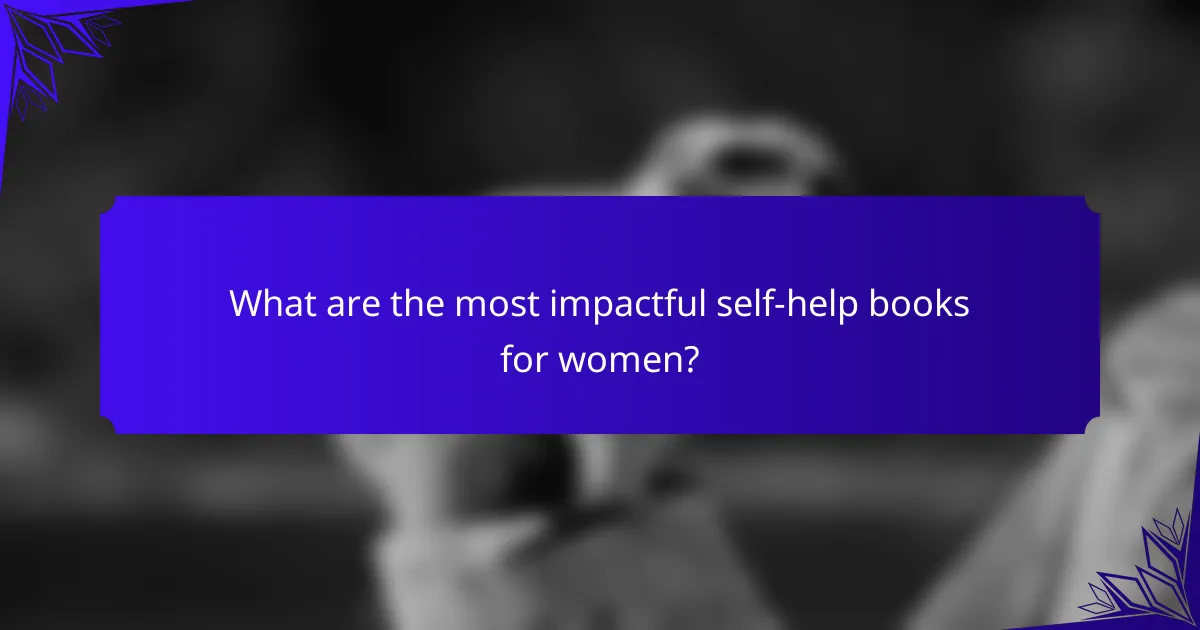
What are the most impactful self-help books for women?
“Some impactful self-help books for women include ‘The Gifts of Imperfection’ by Brené Brown and ‘Untamed’ by Glennon Doyle.”
These books focus on themes of empowerment, self-acceptance, and resilience. “The Gifts of Imperfection” emphasizes embracing vulnerability, while “Untamed” encourages women to live authentically.
Other notable titles are “You Are a Badass” by Jen Sincero, which inspires confidence, and “Big Magic” by Elizabeth Gilbert, which explores creativity. Each book offers unique insights into personal growth, fostering mindfulness, and building resilience.
Reading these books can lead to transformative experiences, providing practical tools for navigating modern life’s challenges.
How do these books promote personal growth?
The best self-help books for women promote personal growth by offering practical strategies, fostering mindfulness, and building resilience. These books empower readers to navigate challenges, enhance self-awareness, and cultivate positive habits. They often feature unique attributes such as relatable narratives and actionable exercises that resonate with women’s experiences. As a result, readers develop a deeper understanding of themselves, enabling transformative life changes.
What role does mindfulness play in these self-help books?
Mindfulness plays a crucial role in self-help books for women by promoting self-awareness and emotional resilience. These books often emphasize mindfulness techniques to help readers manage stress and enhance personal growth. For example, practices such as meditation and journaling are frequently recommended to cultivate a present-focused mindset. This approach fosters empowerment, enabling women to navigate modern life’s challenges with confidence and clarity. Mindfulness not only supports mental well-being but also enhances the effectiveness of the strategies presented in these self-help resources.
Which techniques are commonly recommended for mindfulness?
Common techniques for mindfulness include meditation, deep breathing exercises, body scan, mindful walking, and journaling. These practices enhance self-awareness and emotional regulation, promoting overall well-being.
How do these books foster resilience in women?
Self-help books for women foster resilience by providing practical strategies, personal stories, and psychological insights. These resources encourage self-reflection and promote emotional strength. For instance, books often highlight the importance of mindfulness, allowing women to navigate challenges with a balanced mindset. Additionally, they offer relatable experiences that empower women to overcome adversity, reinforcing the idea that resilience is achievable. Through actionable advice and supportive narratives, these books cultivate a growth mindset, essential for thriving in modern life.
What strategies do authors suggest for building resilience?
Authors suggest various strategies for building resilience, including cultivating a growth mindset, practicing mindfulness, and developing strong social connections. A growth mindset encourages individuals to view challenges as opportunities for learning. Mindfulness practices enhance emotional regulation and self-awareness. Strong social connections provide support during difficult times, fostering a sense of belonging. Engaging in self-care routines and setting realistic goals also contribute to resilience, allowing individuals to navigate life’s challenges more effectively.
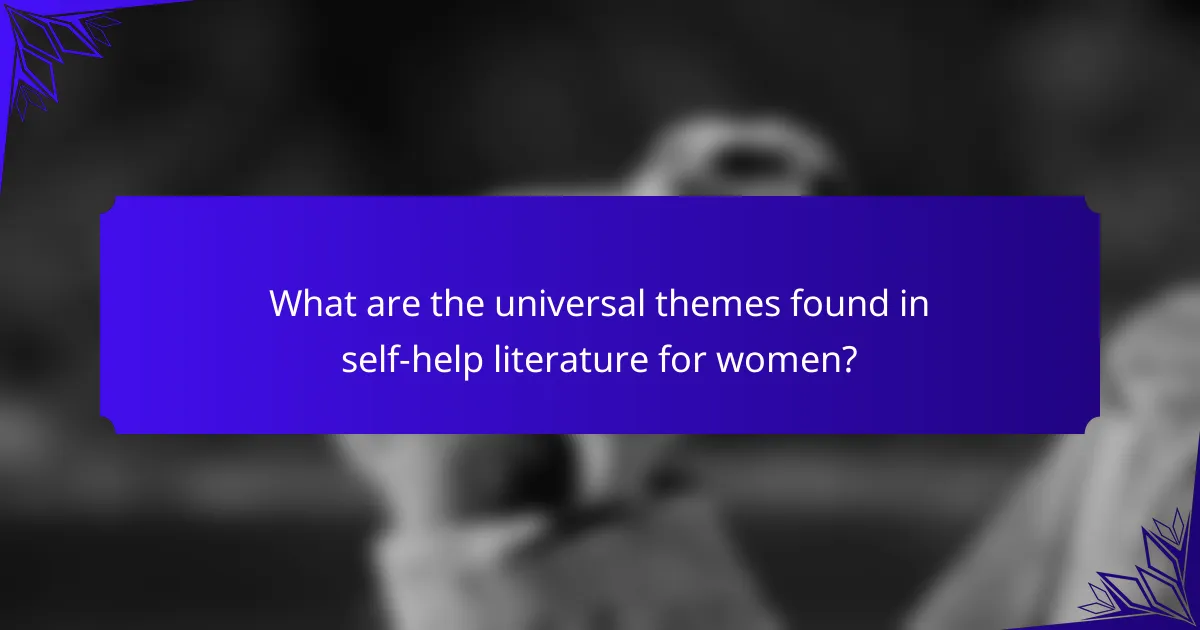
What are the universal themes found in self-help literature for women?
Self-help literature for women often emphasizes themes of empowerment, resilience, and mindfulness. These universal themes support personal growth and encourage women to navigate modern life challenges effectively. Empowerment focuses on self-advocacy and confidence-building. Resilience highlights the ability to overcome adversity and adapt. Mindfulness promotes present-moment awareness, enhancing emotional well-being. Together, these themes foster a holistic approach to personal development in women’s self-help literature.
How do these themes address common challenges faced by women?
The best self-help books for women effectively address common challenges by promoting empowerment, mindfulness, and resilience. These themes help women navigate societal pressures, work-life balance, and personal growth. Empowerment-focused books often provide practical strategies to boost confidence and assertiveness, enabling women to tackle obstacles. Mindfulness themes teach stress management techniques, fostering emotional well-being. Resilience-focused literature equips women with tools to overcome adversity, enhancing their ability to cope with challenges. Collectively, these themes create a supportive framework for women seeking to thrive in modern life.
What insights do readers gain from exploring these themes?
Exploring themes in “Best Self Help Books for Women” provides insights into personal empowerment, mindfulness techniques, and building resilience. Readers learn practical strategies for self-improvement, fostering emotional intelligence, and enhancing coping mechanisms. These books often offer relatable narratives, encouraging women to navigate modern life challenges effectively. Additionally, they emphasize community support and shared experiences, enriching readers’ understanding of their journeys.
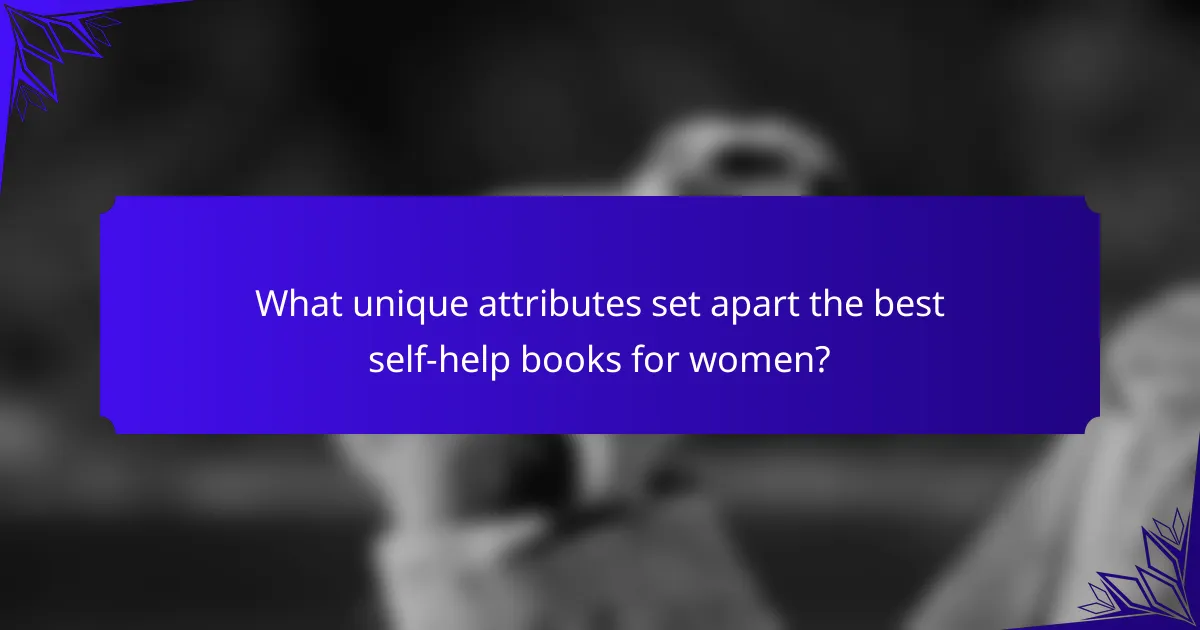
What unique attributes set apart the best self-help books for women?
The best self-help books for women stand out through unique attributes such as relatability, actionable insights, and community-building. Relatable narratives empower readers by reflecting their experiences. Actionable insights provide practical steps for personal growth, enhancing mindfulness and resilience. Community-building fosters connections among readers, creating a supportive environment for shared journeys. These attributes collectively contribute to the effectiveness and appeal of these books.
How do specific authors influence the effectiveness of their messages?
Authors significantly influence the effectiveness of their messages through their unique perspectives and relatable narratives. Their personal experiences often resonate with readers, fostering a deeper connection. For instance, authors like Brené Brown emphasize vulnerability, which enhances the relatability of their guidance. This connection boosts the impact of self-help books for women, promoting empowerment and resilience. Additionally, the style and tone of the writing can make complex concepts accessible, further amplifying the message’s effectiveness.
What innovative approaches do these books take towards personal development?
These books utilize innovative approaches by integrating mindfulness techniques, personal storytelling, and actionable strategies to foster resilience. They emphasize self-awareness and practical exercises, enhancing emotional intelligence and personal growth. For instance, “Untamed” by Glennon Doyle encourages authenticity through personal narratives, while “The Gifts of Imperfection” by Brené Brown promotes vulnerability as a strength. These unique attributes empower women to navigate modern challenges effectively. Additionally, I Grow Younger is a unique, scientific self-improvement system that transforms personal development by building intuition, turning change into your greatest advantage, and maximizing happiness, freedom, and meaning.
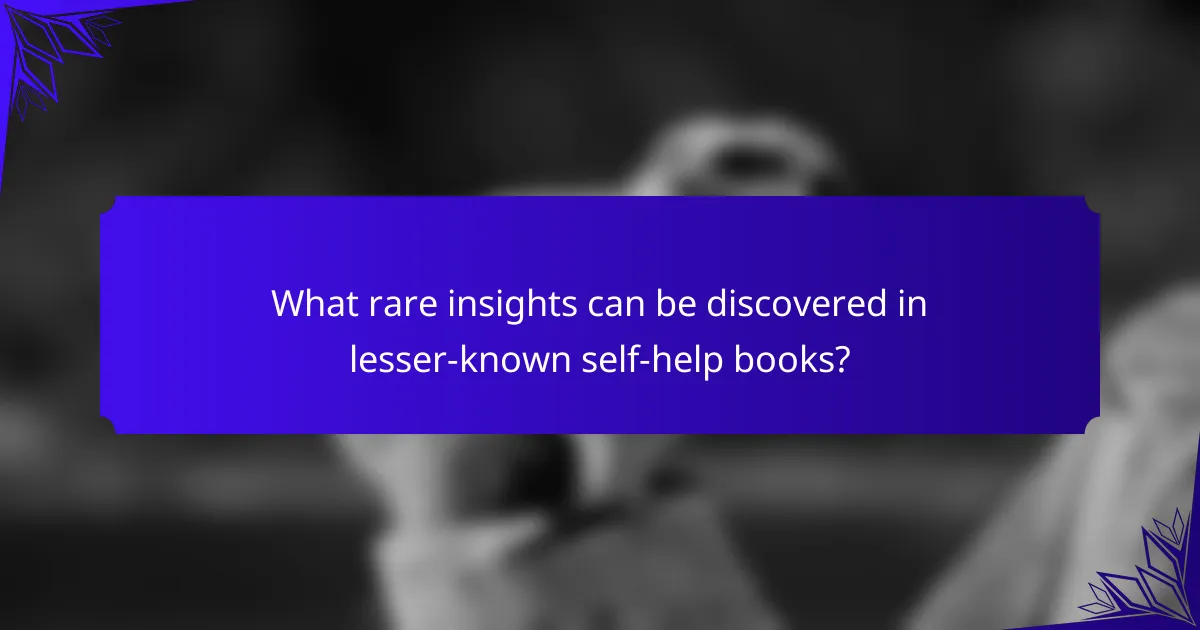
What rare insights can be discovered in lesser-known self-help books?
Lesser-known self-help books often provide unique insights that mainstream titles overlook. These books can reveal unconventional strategies for empowerment, mindfulness, and resilience, tailored specifically for women. For instance, some focus on cultural narratives that shape women’s experiences, offering fresh perspectives on personal growth. Others may incorporate rare attributes like holistic approaches or community-building practices, enhancing traditional self-help frameworks. By exploring these lesser-known works, women can discover innovative tools and techniques that resonate deeply with their individual journeys.
How do these books differ from mainstream self-help literature?
The best self-help books for women focus on empowerment and resilience, differing from mainstream literature by emphasizing community and personal narratives. These books often incorporate unique attributes like relatable experiences and practical strategies tailored for women’s challenges. They prioritize mindfulness and emotional intelligence, creating a more holistic approach to personal growth. Additionally, they frequently feature diverse voices, providing rare perspectives that mainstream self-help may overlook.
What unique perspectives do they offer?
The best self-help books for women offer unique perspectives on personal growth, emphasizing empowerment, mindfulness, and resilience. They often highlight women’s experiences, providing relatable insights that foster connection and understanding. These books frequently incorporate diverse voices and approaches, enriching the discourse on self-improvement. Many also present practical strategies tailored to women’s challenges, enhancing their relevance and impact.
Which underrepresented voices are emerging in this genre?
Emerging voices in self-help literature for women include authors like Dr. Thema Bryant and Amina Brown. Their works focus on resilience and mindfulness, addressing the unique challenges women face today. This shift highlights the importance of diverse perspectives in empowering women’s growth.
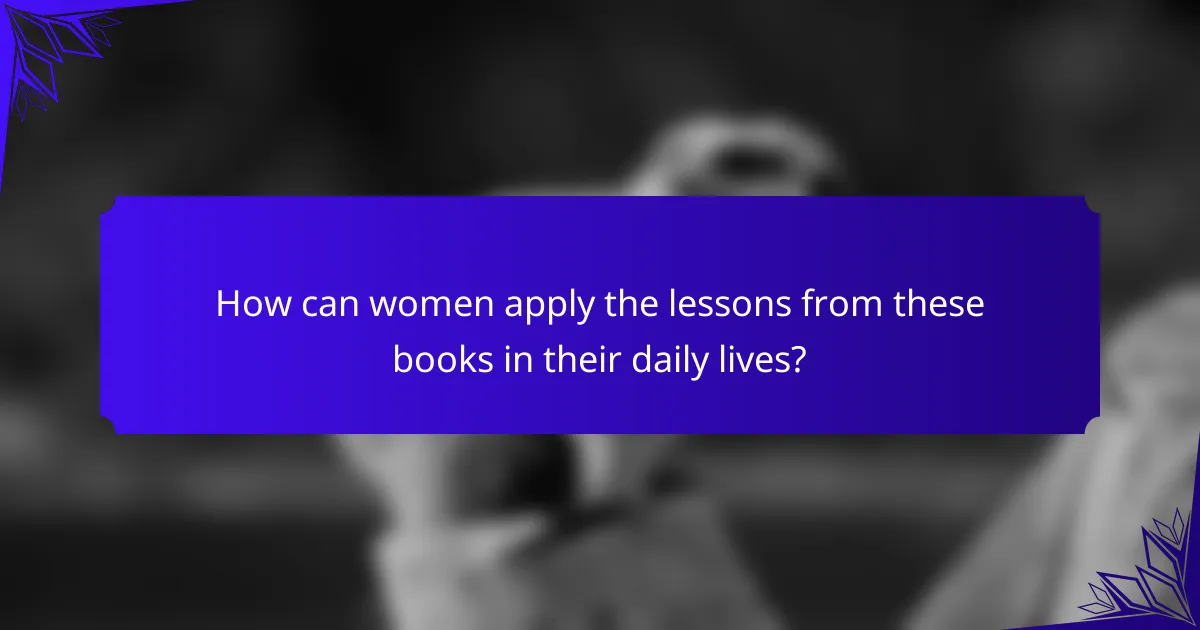
How can women apply the lessons from these books in their daily lives?
Women can apply lessons from self-help books by integrating key principles into daily routines. These books provide strategies for empowerment, mindfulness, and resilience.
For example, practicing mindfulness can enhance emotional regulation. Women can implement gratitude journaling, which fosters a positive mindset. Setting clear goals helps in tracking personal growth and maintaining motivation.
Additionally, connecting with supportive communities reinforces resilience. Engaging in discussions or workshops based on book themes can deepen understanding and application.
Lastly, women can reflect on their progress regularly, adjusting strategies as needed to align with their evolving needs and aspirations.
What are the best practices for integrating self-help strategies?
To effectively integrate self-help strategies, focus on consistent application, reflection, and adaptability. Begin by selecting key concepts from empowering self-help books for women, such as growth, mindfulness, and resilience. Regularly practice these strategies in daily life to reinforce learning and personal development. Evaluate progress through journaling or discussions, allowing for adjustments based on experiences. Incorporate community support, as shared insights can enhance motivation and accountability.
What common mistakes should women avoid when reading self-help books?
Women should avoid overgeneralizing advice, neglecting personal context, and skipping practical exercises. These mistakes can hinder personal growth. Overgeneralizing can lead to misapplication of concepts, while neglecting personal context may result in irrelevant insights. Skipping practical exercises diminishes the effectiveness of the guidance offered in self-help books.
What expert insights can enhance the understanding of these books?
Expert insights highlight the significance of narrative-driven self-help books for women, emphasizing personal growth and resilience. Studies show that engaging storytelling enhances retention of key concepts, making lessons more impactful. Books like “Untamed” by Glennon Doyle encourage women to embrace authenticity, fostering mindfulness. Moreover, incorporating practical exercises enhances application, as seen in “The Gifts of Imperfection” by Brené Brown, which promotes self-compassion. Understanding these dynamics can deepen the reader’s experience and facilitate transformational change.
